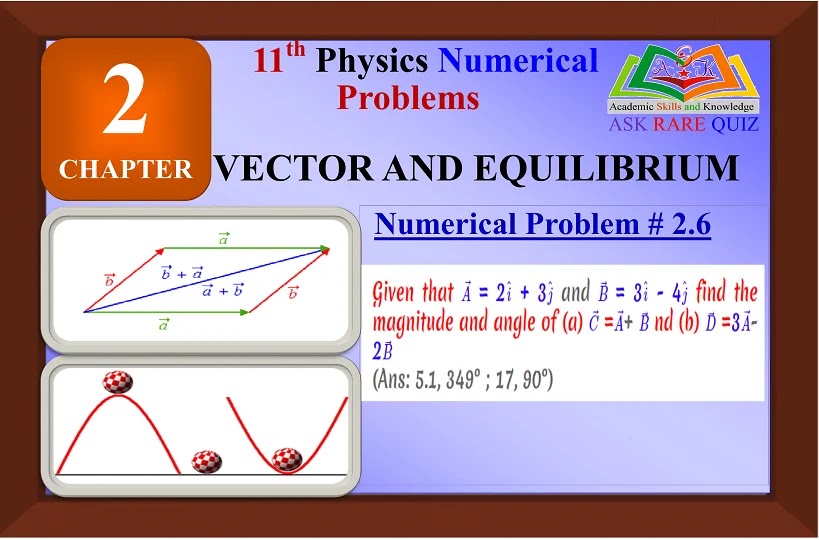Given that `\vec {A}` = 2`\hat {i}` + 3`\hat {j}` and `\vec {B}` = 3`\hat {i}` - 4`\hat {j}` find the magnitude and angle of (a) `\vec {C}` =`\vec {A}`+ `\vec {B}` and (b) `\vec {D}` =3`\vec {A}`- 2`\vec {B}`
(Ans: 5.1, 349° ; 17, 90°)
Given:
`\vec {A}` = 2`\hat {i}` + 3`\hat {j}``\vec {B}` = 3`\hat {i}` - 4`\hat {j}`
`\vec {C}` = `\vec {A}` + `\vec {B}`
`\vec {D}` = 3`\vec {A}` - 2`\vec {B}`
To Find:
(a)Magnitude of the Vector `\vec {C}` = |`\vec {C}`| = ?
The angle of the Vector `\vec {C}` = Ө = ?
(b)
Magnitude of the Vector `\vec {D}` = |`\vec {D}`| = ?
The angle of the Vector `\vec {D}` = Ө = ?
Solution:
(a)
`\vec {C}` = `\vec {A}` + `\vec {B}`
By putting corresponding values we have
`\vec {C}` = 2`\hat {i}` + 3`\hat {j}` + 3`\hat {i}` - 4`\hat {j}`
`\vec {C}` = 5`\hat {i}` - `\hat {j}`
Here x-component = 5 and y-component = -1 So, to find its magnitude |`\vec {C}`| we have
|`\vec {C}`| = `\sqrt {x^2 + y^2}`
by putting values
C = `\sqrt {(5)^2 + (-1)^2}`
C = `\sqrt {25 + 1}`
C = `\sqrt {26}`
C = 5.1 --------Ans (1)
Thus the magnitude of the vector `\vec {C}` is 5.1
To find the angle of the vector `\vec {C}` with respect to X-axis, we have the formula
tan Ө = `\frac {y}{x}`
or
Ө = tan⁻¹ `\frac {y}{x}`
by putting value of x and y
Ө = tan⁻¹ `\frac {-1}{5}`
Ө = tan⁻¹ (-0.2)
Ө = 12⁰
As x-component = 5 (+ve) and y-component = -1 (-ve) therefore it lies in the 4th quadrant. so we will subtract the angle Ө from 360⁰
Ө = 360⁰ - 12⁰
Ө = 348⁰ --------Ans (2)
Thus the Angle of the vector `\vec {C}` with respect to x-axis is 348⁰
(b)
`\vec {D}` = 3`\vec {A}` - 2`\vec {B}`
By putting corresponding values we have
`\vec {D}` = 3(2`\hat {i}` + 3`\hat {j}`) - 2( 3`\hat {i}` - 4`\hat {j}`)
`\vec {D}` = 6`\hat {i}` + 9`\hat {j}`) - 6`\hat {i}` + 8`\hat {j}`)
`\vec {D}` = 0`\hat {i}` + 17 `\hat {j}`
or
`\vec {D}` = 17 `\hat {j}`
Here x-component = 0 and y-component = 17 So, to find its magnitude |`\vec {D}`| we have
|`\vec {D}`| = `\sqrt {x^2 + y^2}`
by putting values
D = `\sqrt {(0)^2 + (17)^2}`
D = `\sqrt {0 + (17)^2}`
D = `\sqrt {(17)^2}`
D = 17 --------Ans (1)
Thus the magnitude of the vector `\vec {D}` is 17
To find the angle of the vector `\vec {D}` with respect to X-axis, we have the formula
tan Ө = `\frac {y}{x}`
or
Ө = tan⁻¹ `\frac {y}{x}`
by putting value of x and y
Ө = tan⁻¹ `\frac {17}{0}`
Ө = tan⁻¹ (0)
Ө = 90⁰ --------Ans (2)
As x-component = 0 (+ve) and y-component = 17 (+ve) therefore the angle will lie along the Y-axis ie. Ө = 90⁰
************************************
| Numerical Problem 2.6 ⇑ |
⇑
************************************
Shortcut Links For
1. Website for School and College Level Physics 2. Website for School and College Level Mathematics 3. Website for Single National Curriculum Pakistan - All Subjects Notes
© 2022-Onwards by Academic Skills and Knowledge (ASK)
Note: Write me in the comment box below for any query and also Share this information with your class-fellows and friends.
1. Website for School and College Level Physics
2. Website for School and College Level Mathematics
3. Website for Single National Curriculum Pakistan - All Subjects Notes
© 2022-Onwards by Academic Skills and Knowledge (ASK)
Note: Write me in the comment box below for any query and also Share this information with your class-fellows and friends.


0 Comments
If you have any QUESTIONs or DOUBTS, Please! let me know in the comments box or by WhatsApp 03339719149